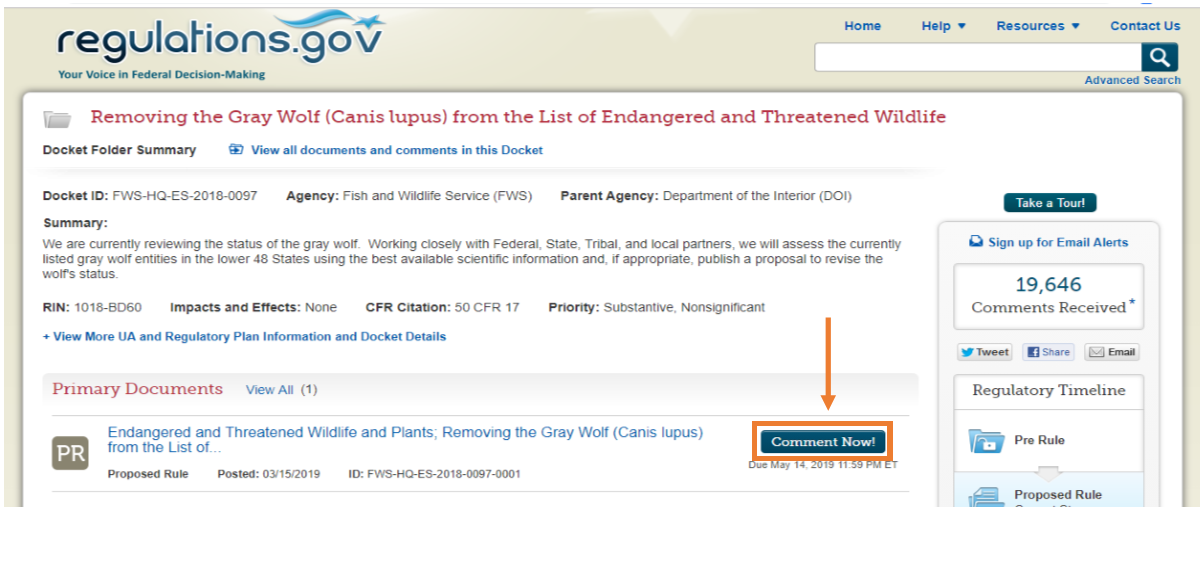Attention: the deadline to submit comments has been extended to Monday, July 15, 2019.
We need your help. We have until May 14, 2019 to submit public comments that OPPOSE the US Fish and Wildlife Service’s proposal to delist wolves throughout the lower 48 states. Information on the proposed rule and how to comment may be found here. (View the document and click on Comment Now to enter your comments.)

On March 14, 2019, a Donald Trump appointee, Interior Secretary David Bernhardt and the U.S. Fish and Wildlife Service, proposed a rule to strip gray wolves throughout the continental United States of Endangered Species Act (ESA) protections, returning the iconic species to state management.
The administration’s action to remove gray wolf ESA protection brought immediate opposition from national organizations including the Sierra Club, who emphasized that "Endangered Species Act protections are still essential to help wolves recover and return to more of the places they once lived; the Trump wolf delisting plan will prove disastrous for wolf recovery.”
When wolves were delisted in January of 2012, our state legislature enacted Wisconsin Act 169, a state law mandating a “harvest” of our state’s wolves, through every manner of hunting and trapping, including the use of dogs to hunt wolves. It also mandated a management goal of 350 wolves based on now-obsolete information. This led Wisconsin to become the only state in the country, to allow this practice. Three years of aggressive hunting and trapping ensued, culminating in the death of hundreds of wolves in Wisconsin and several over-quota seasons. In these three short years over 1,500 wolves were killed by trophy hunters, largely by trapping. The killing came to an end on December 19, 2015, when a federal court restored protections to Western Great Lakes wolves, including those in Wisconsin. The judge concluded this “virtually unregulated” killing of wolves posed a continued threat to the species’ recovery.
Sierra Club’s Wisconsin Wildlife Committee, which includes hunters, seeks to protect wolves until Wisconsin commits to an updated wolf management plan that is aligned with best available science and ethical wildlife practices.
Here are some important facts that you may wish to point out in your public comments:
1) Wolves affect and change deer browsing behavior, resulting in forests up to 40% more diverse, for a healthier stronger forest landscape.
2) The Native First Nations in the Great Lakes view the Wolf as a spiritual brother and do not want them killed recreationally. The United States needs to respect the Sovereign Tribes Ceded Rights and their relationship with Wolves.
3) As an apex predator, wolves play a critical role in Wisconsin’s ecosystem and help to control the spread of Chronic Wasting Disease (CWD).
4) Ongoing federal protection is necessary until such time as Wisconsin, and other Great Lakes states, revise and update their wolf management plans to conform to best available science and to prohibit unwarranted “recreational” trophy hunting of wolves. Here is a link that may interest you.
5) Claims of Livestock depredations are exaggerated and unsubstantiated. Although accounts of livestock losses have fueled attacks on wolves and their Endangered Species Act protection, according to a recently published analysis of government data, predator species, including wolves, cause fewer than one percent (0.4 percent) of unwanted cattle and sheep losses. See https://www.humanesociety.org/sites/default/files/docs/HSUS-Wolf-Livestock-6.Mar_.19Final.pdf
Thank you for your commitment to Wisconsin wildlife. If you are interested joining the volunteers on our JMC Wildlife Committee contact the John Muir Chapter office at 608-256-0565. We are focused on holding Wisconsin wildlife management accountable to best available science and in line with ethical hunting precepts, with respect to a variety of Wisconsin species, including beaver, bear, wolf, and coyotes.
Written by Sierra Club John Muir Chapter Wildlife Committee